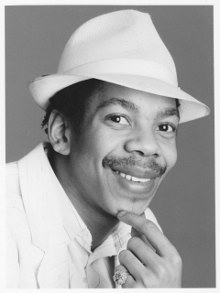Smiley Culture
| Smiley Culture | |
|---|---|

Mid-1980s publicity photo
|
|
| Background information | |
| Birth name | David Victor Emmanuel |
| Born |
10 February 1963 South London, England |
| Died | 15 March 2011 (aged 48) Warlingham, Surrey, England |
| Genres | Reggae, dancehall |
| Occupation(s) | Singer, deejay, television presenter |
| Instruments | Vocals |
| Years active | Late 1970s – early 1990s |
| Labels | Fashion, Polydor |
David Victor Emmanuel (10 February 1963 – 15 March 2011), better known as Smiley Culture, was a British reggae singer and DJ known for his 'fast chat' style. During a relatively brief period of fame and success, he produced two of the most critically acclaimed reggae singles of the 1980s. He died on 15 March 2011, aged 48, during a police raid on his home. An inquest found that his death was a suicide.
Emmanuel was raised in Stockwell, south London, was a son of a Jamaican father and Guyanese mother. He was educated at Tulse Hill School. His 'Smiley' nickname was gained due to his method of chatting up girls at school – he would ask them for a smile. Prior to his recording career he worked as a DJ with many of London's reggae sound systems, most often with the Saxon Studio International system, where he met and worked with a number of other reggae artists, including Maxi Priest, Papa Levi and Tippa Irie.
Signed to the London-based reggae record label Fashion Records, his first single "Cockney Translation" (1984) was a Jamaican's guide to the East End dialect – '"Cockneys have names like Terry, Arfur and Del Boy/We have names like Winston, Lloyd and Leroy". The song mixed cockney dialect with London's version of Jamaican patois, translating between the two.Simon Reynolds has often cited this song in his writings, arguing that it presaged the creation of a new hybrid accent in which white East Londoners would adopt many terms of black origin. The song's lyric was later used in schools as an example of how immigration has affected the English language. Smiley Culture popularised the 'fast chat' style of deejaying that had originated with Jamaican deejays such as Ranking Joe, and was developed further by British toasters, particularly those on the Saxon sound system such as Peter King.
...
Wikipedia
